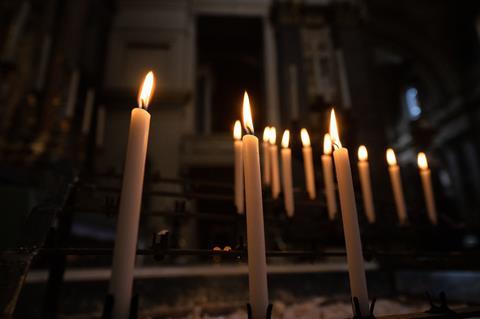The world may seem dark this advent, but that’s even more reason to turn to Jesus, the light of the world. He illuminates the darkness and lightens our load. That’s something worth celebrating, says Rev George Pitcher

To wait for the coming of light this Advent season seems preposterous. It may also appear somewhat impertinent, given what has unfolded in the region we’re still pleased to call the holy lands since the unspeakable acts of 7 October.
I feel far from alone in identifying a Christian complacency, rather than hope, in awaiting the coming of the light at Christmas this year. A friend at a central London church tells me that corporate organisers of a number of carol concerts have asked for ‘O come, O come Emmanuel’ to be taken off the playlist. They can’t bring themselves to sing the words: “and ransom captive Israel / that mourns in lonely exile here”.
We can’t save the world on our own. But each light, like those candles, can light another one
It’s not just the war in Gaza, piled upon the protracted horrors of the (now almost overlooked) war in Ukraine. The West appears broken and futile, with the implausible resilience of Trumpian nationalism in the US and similarly frightening political developments in Europe.
In the UK, a principal intra-governmental debate is taking place about how best to break international law to send our refugees to Rwanda. This occurs against the seasonal backdrop of the founding Christian story of a holy family driven into Egypt under threat of death. The irony of Israel bombing Palestinian families into Egypt today is almost too painful to witness.
So what does our coming of the light look like? A radiant beam of righteousness and justice, or a guttering candle in this world’s cold winter night?
Light in the darkness
Struggling in the kitchen the other day to think of what I might say on this subject in a broadcast slot, I could hear my family endeavouring to get the dining room ready for Christmas. Something was called out to me. My internal reaction was: Sshhh, I’m trying to think!
It turned out that the wall lights in the dining room would only come up dimly. My son explained the science: I thought we had energy-efficient LED bulbs, but actually they were the older compact fluorescent lamps. The dimmer switch is designed for filament bulbs that use more current, so it needs at least one of those in the circuit to draw the current through at a level capable of illuminating the other bulbs.
It struck me as a metaphor for the light of human hope in darkness. The point of light in darkness is not to admire its own illumination, but to ignite light in others. Not unlike the way hundreds of candles are lit from a single source at the start of one of those carol services.
Furthermore, the Christmas story is old, in human terms. Even, we might say, ‘old-fashioned’. It is, in this respect, like an old light bulb, necessary for increasing the current to illuminate the newer ones. To stretch the metaphor to breaking point, the process is energy-efficient, at a time when we feel drained and lacking in resource.
Tread lightly
The second aspect of light that I’m finding helpful to consider is its alternative meaning: light, as in lack of weight. The gospel promise of the light of the world (that, when followed, will always illuminate the world for the pilgrimage through it) tends to obscure - or even hide in the dark - this other lightness of touch.
The Christian injunction is that the burden of faith is a light one. In short, it isn’t actually meant to be burdensome. It follows that we’re called to tread softly, travel lightly. Indeed, what is called the Great Commission specifically instructs disciples to be light on their feet: “Take nothing with you for the journey” (Luke 9:3).
This can be read any number of ways. Not least, for the environmentalist, it can re-affirm the injunction to “leave only footprints” (though probably not of the carbon variety). But, for our purposes here, it must mean that Christian mission is to tread lightly in the world. It’s not to feel like a burden, or it’s surely not something that anyone would want to carry.
The point of light in darkness is not to admire its own illumination, but to ignite light in others
The Christian hope is that Christmas brings both light to illuminate human darkness and light that it’s easy to bear. Because the world isn’t easy to bear at the moment or, to be honest, at any time.
For the individual, that’s burden-lifting too. We can’t save the world on our own. But each light, like those candles, can light another one – it’s in the nature of flames to spread, so light is catching. And, while it’s incumbent on anyone of virtue never to give up trying, we shouldn’t make the job tiresome or exhausting. At Christmas, after all, we can celebrate that the heavy lifting has been done already.





































No comments yet